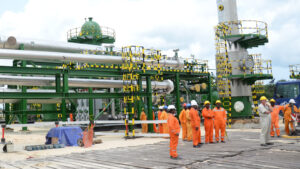A new study by risk consultancy Verisk Maplecroft has shown Nigeria may have difficulty producing its huge oil and gas reserves.

The study states that Africa’s number two exporter; Nigeria, where reserves are concentrated around the Niger Delta river system, droughts and flooding present threats.
The report further said that apart from Nigeria, much of the world’s reserves of oil and gas is under threat from rising tides, storms, floods and extreme temperatures caused by climate change.
Access to the equivalent of 600 billion barrels or 40 per cent of the world’s recoverable oil and gas reserves could be affected by the wild weather, with major producers Saudi Arabia, Iraq and Nigeria among the most vulnerable, the UK-based firm wrote in a research note.
Climate change confronted the industry this year when extreme cold weather pummelled the main U.S. oil, gas and refining hub on the Gulf Coast, leading to long outages and reduced output.
“These types of events are going to become more frequent and more extreme, creating even greater shocks within the industry,” said Rory Clisby, environmental analyst at Verisk Maplecroft.
Just over 10 per cent of the world’s commercially recoverable reserves are in areas rated by the consultancy as extreme risk, while nearly a third were deemed high risk.
For Saudi Arabia, extreme heat, water shortages and dust storms could be the “Achilles’ heel” for the top oil exporter, the researchers found.
The Organised Private Sector of Nigeria (OPSN) has urged Federal Government to take steps to address possible socio-economic issues arising from the proposed the removal of fuel subsidy.
The Chairman, OPSN, Mr Taiwo Adeniyi, made this known at a news conference on Tuesday in Lagos.
Adeniyi said that the controversy being generated by the proposed fuel subsidy removal was getting to a “crescendo”, hence, the need to guide government and other stakeholders.
Read Also: Maritime Terms and Definitions
“We urge that government should first, as a matter of boosting Nigerians and other stakeholders confidence and demonstrating its goodwill, address the following as a prerequisite to the total removal of the subsidy:
“The resuscitation of the four refineries that millions of dollars had been invested in their Turn Around Maintenance or outright sale of the refineries to private investors to enhance their sustainability.
“Also, specific reliefs to address the anticipated drastic reduction in the citizen’s disposable income and standard of living.
“It is expected that an increase in fuel price will have a direct and immediate consequence on transportation and costs of food stuff, among others: a more sustainable, well-thought-out relief should be proposed.
“Specific relief to workers and organised businesses, not only to reduce the immediate effects of the increase, but reliefs that will ensure and enhance the capacity of businesses to remain sustainable and continue to provide jobs, ” he said.
Kindly like us on Facebook
















Discussion about this post